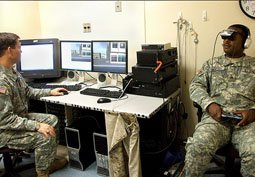By: Jessica Berman
Researchers have developed a possible treatment for post-traumatic stress disorder, a mental condition characterized by increased anxiety, depression and problems with memory triggered by witnessing a traumatic event. Scientists say the drug potentially could be given to someone immediately following a trauma to prevent development of the psychiatric condition.
An international team of researchers has identified a gene linked to the development of post -traumatic stress disorder.
Raul Andero Gali, a researcher at Emory University in Atlanta, Georgia, studies the molecular mechanisms underlying PTSD. It is the only psychiatric disorder, according to Gali, that has a known trigger, such as a car accident or being in a combat zone.
“So we can even define more clearly which is the stimulus or the stressor that trigger[s] the disease, whereas with other psychiatric diseases it is way more difficult. For example, with depression or schizophrenia it is more uncertain what is triggering that disease,” he said.
Gali and colleagues at Emory, the University of Miami in Florida, Scripps Research Institute in Florida and the Max Planck Institute of Psychiatry in Munich, Germany identified a gene that is abnormal in PTSD.
In some people experiencing a high degree of stress, the gene, called OPRL1, releases a protein receptor for a molecule called nociceptin in the brain. When that happens, Gali says they experience symptoms of post-traumatic stress disorder. But researchers found a compound that blocks the receptor, reducing symptoms of anxiety and fear in a mouse model of PTSD.
Gali says investigators tested their drug, called SR8993, in rodents conditioned to fear a foot shock whenever they heard a particular tone. The rodents, learning that the sound was a danger signal, became very stressed out upon hearing the tone.
Immediately after the pairings of sound and foot shocks, Gali says some of the mice were given a placebo or compound with no effect, while researchers administered SR8993 to another group of rodents.
“The day after the animals were tested to see how afraid they were for the tone. And the animals that got the compound SR8993 presented less fear to the tone. So their conservation of fear memories is decreased,” he said.
Gali says much work needs to be done to see whether the compound is effective in humans. But he envisions giving the drug to soldiers returning home from a war zone, for example, to keep them from developing PTSD.
An article on a possible treatment for post-traumatic stress disorder is published in the journal Science Translational Medicine.



